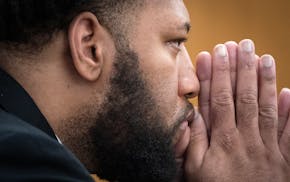For more than five decades, Harvey Feldman was a passionate advocate for parks and recreation, which he believed were critical to a community's well-being. He took great pride in the Minneapolis parks system, where he served as a top official for 20 years.
"I have always, from the beginning of time it seems, believed that parks and recreation could improve the lives of people," Feldman said in 2007 when he was inducted into the American Academy for Park and Recreation Administration, an elite group of park administrators. "That was my motivation then and that remains my motivation today."
Feldman, 84, of New Hope, died Nov. 5 in Tucson, Ariz., where he and his wife, Andrea, had a second home. He had been ill, but the precise cause of death had yet to be determined.
Feldman was parks director in New Hope and Richfield, interim parks director in St. Louis Park, and assistant parks superintendent in Minneapolis before becoming director of the Recreation Facilities Management Institute at the University of Minnesota, teaching a new generation of aspiring park administrators.
"Harvey embodied the highest standard of public service," said Rip Rapson, former Minneapolis deputy mayor. "He was as dedicated to the mission of the Minneapolis Park and Recreation system as it was possible to be, working tirelessly to create the kind of forward-looking, innovative infrastructure and programming that made Minneapolis unique among its peers."
Feldman grew up in north Minneapolis and went to North High School, where he played football, basketball and baseball and was named the Hy Truman outstanding Jewish scholar-athlete by the Mercury Club in 1957. Brett Feldman, of Minneapolis, said his father wanted to be a dancer or a professional baseball player. But he couldn't hit the curve ball during a tryout for the Gopher team at the U, so he focused on a career in parks and recreation.
Fresh out of the U, Feldman became New Hope's first parks director in 1963 at the age of 23. He shepherded a referendum in New Hope in 1968 to acquire land and build out the city's park system. A bridge in Northwood Park in New Hope was named for him in 2022.
"He had this way of instilling that wonder for parks and recreation, trying to encourage people to think about the parks, and connect with the residents to try to make the system even better," said New Hope Parks Director Susan Rader.
During his tenure as director of the Richfield park system, Feldman led the effort to acquire the land for and create the Wood Lake Nature Center, Richfield Ice Arena and Taft Park. As assistant parks superintendent in Minneapolis from 1975 to 1996, he helped develop and implement more than 20 collaborations with the Minneapolis school district and community-based organizations, including the Boys and Girls Clubs and the American Indian Movement.
"He brought energy to the job," said Mary Merrill, who served two stints as Minneapolis parks and rec superintendent after working as a training coordinator under Feldman. She said Feldman "was very community-oriented. He thought it was part of our mission to create warm and welcoming communities."
Brett Feldman, who is president of the Parks & Trails Council of Minnesota, a statewide parks nonprofit, said that as a child he would join his father on jaunts to Minneapolis parks on weekends to talk to people, hear them out and look for ways to do things better. "He didn't believe you could do that by sitting in an office behind a desk," his son said.
"He was a wonderful resource for me," said Meg Forney, president of the Minneapolis Park Board, who leaned on Feldman for his knowledge of park finances when she was involved with People for Parks, the park board's fundraising arm.
Leo McAvoy, a retired U education professor, said Feldman "really connected with the students" when he taught at the U. "They respected his depth of knowledge," said McAvoy. "He was a great guy to work with, very personable and very concerned about the students in his classes. The students realized that he really liked working with them."
With his gentle disposition, Feldman became a mentor for many park administrators. Michelle Snider, executive director of the Minnesota Recreation and Park Association, said he made a difference "both as a professional within both small and large agencies and also as educator. He encouraged and challenged so many of us, both locally and nationally, to advance the profession and its importance in the communities we serve."
Feldman was an outdoors person. He took his children on skiing vacations to Colorado and other states and liked to play golf around the country. "Skiing and golfing were the loves of his life, and the way he hung out with us," said Brett Feldman.
Besides his wife and son, Feldman is survived by his daughter Stephanie, of Tucson, and brother Stan and sister Marilyn, both of New Hope. A celebration of life is still being planned.
Steven Neu of Bismarck, N.D., past president of the National Recreation and Park Association, said Feldman was active on national committees and "a tireless advocate for education, a belief that one never stops learning on the subject of parks and recreation."
Feldman was an advocate "for the little guy," said John Crompton, a recreation, park and tourism science professor at Texas A&M University in College Station. "Harvey believed that recreation should be readily available, should not be charged for, and believed it had tremendous potential for doing good in the community."
Crompton recalled advocating for charges for some rec services at a national meeting of park administrators. "Harvey would stand up and shout, 'No, no, no,'" he said with a laugh. But Feldman, he said, was serious.
Two taken to HCMC following shooting outside U arena after high school graduation Friday

U.S. Rep. Tom Emmer singles out teenage transgender athlete in social media post
Air quality alert extended across Minnesota through Monday due to smoke from Canadian wildfires
